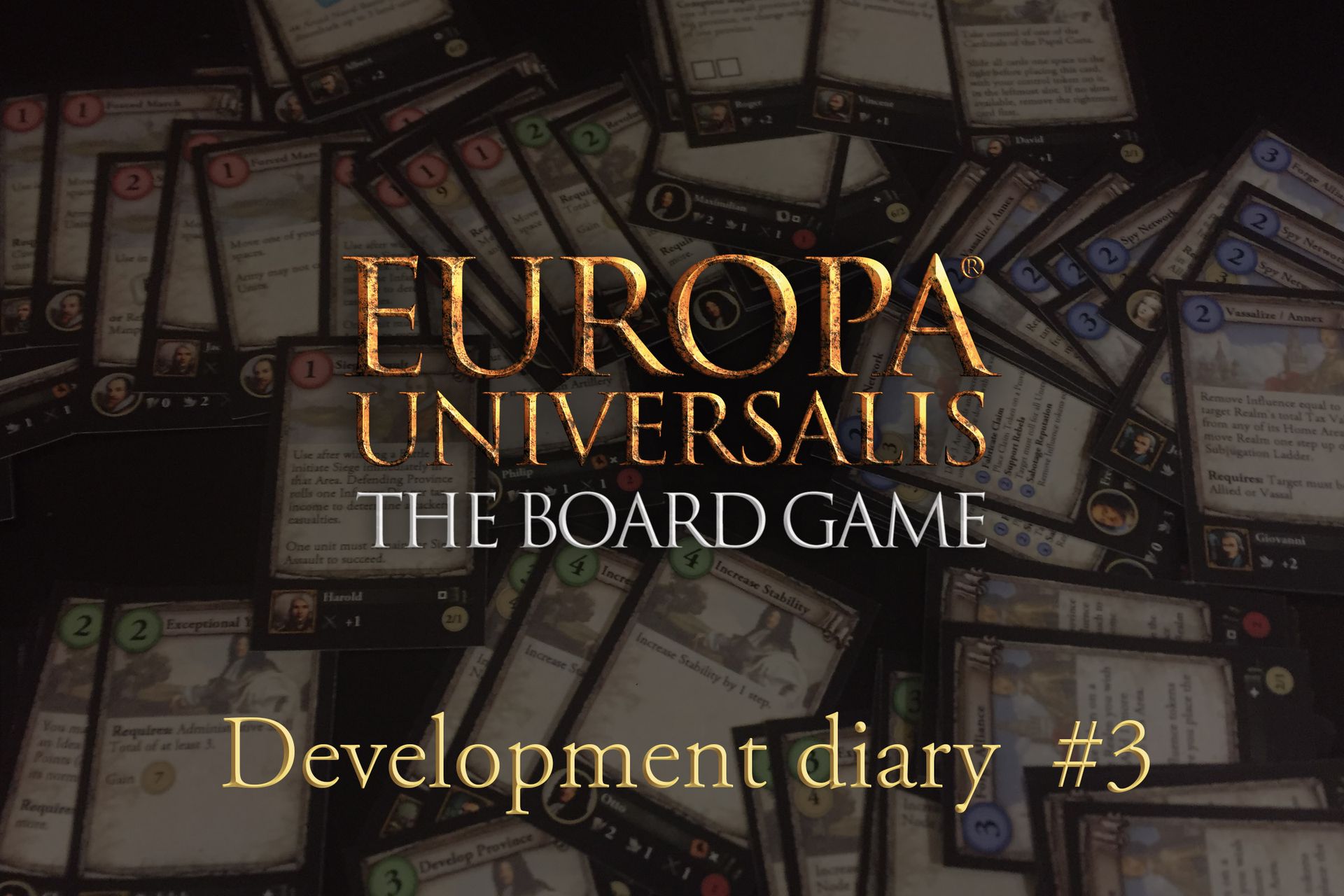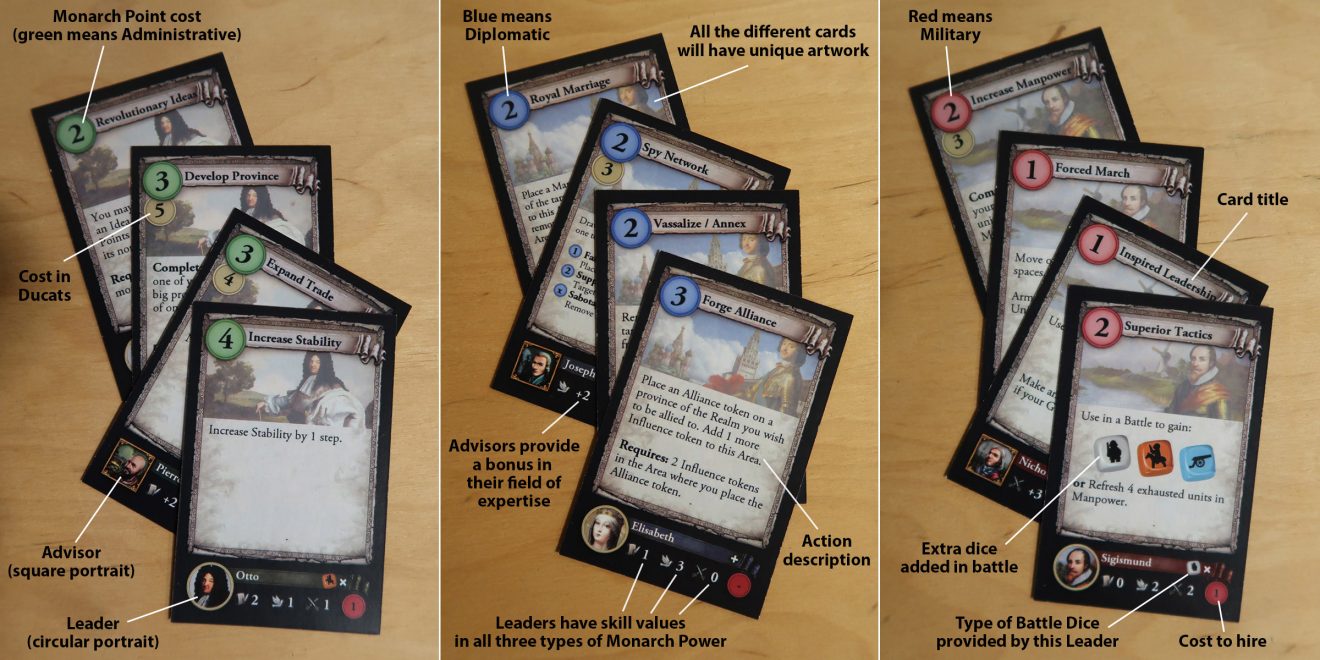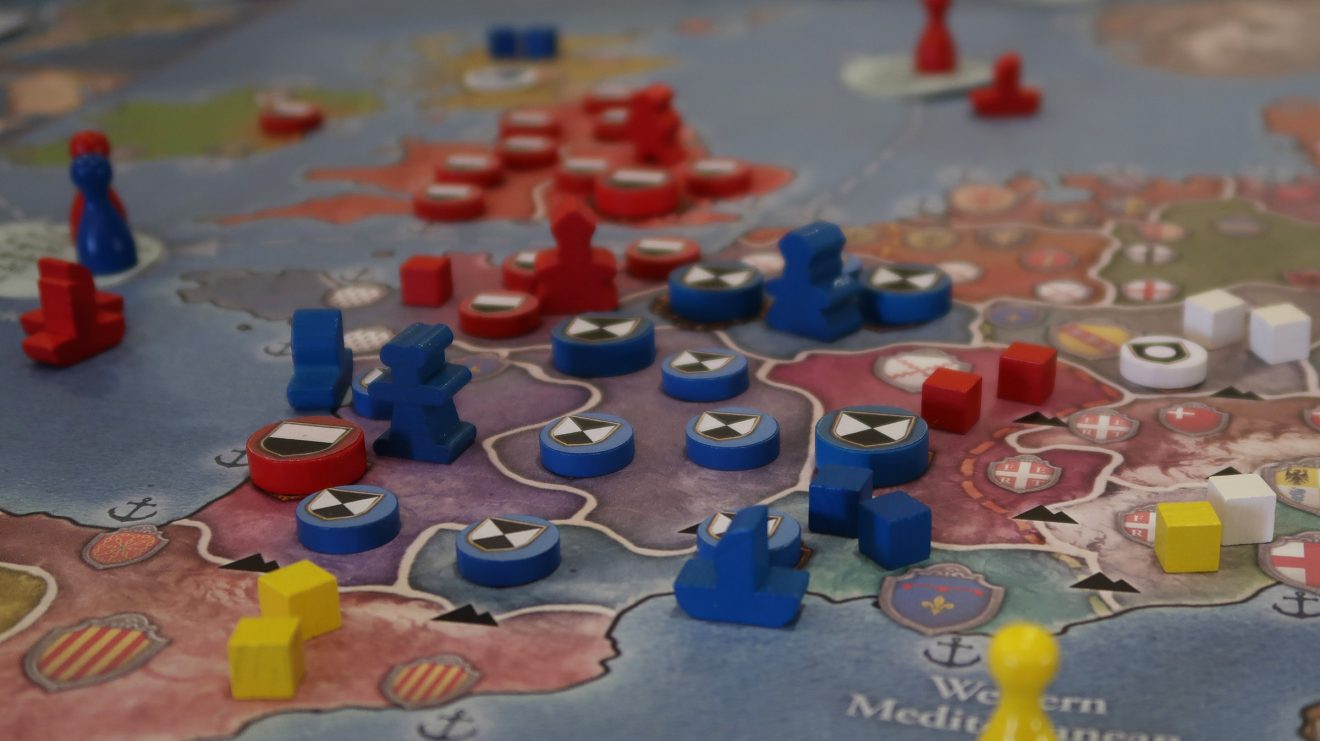
In the third chapter of this Development Diary we will talk about actions and Action Cards. Last time we offered some insights into the Monarch Power system – a form of resources that players in Europa Universalis: The Board Game will depend upon to perform actions in the game.
Action Cards
While players may always perform certain Basic Actions, you will often find the more specialised actions on the Action cards. These are divided into three decks that correspond with the three types of Monarch Power. Accordingly, there is a Military Deck, a Diplomatic Deck and an Administrative Deck. You may always choose which type of Action Cards you want to draw in the Draw Cards Phase. In the Action Phase players take turns performing one action at the time. You can either play an Action Card or execute a Basic Action. This ensures that player down time is low.
 Prototype cards from the Administrative (green), Diplomatic (blue) and Military (red) deck. The text and graphics on these cards are not final, but they show the basic layout.
Prototype cards from the Administrative (green), Diplomatic (blue) and Military (red) deck. The text and graphics on these cards are not final, but they show the basic layout.
(Click image to zoom in.)
The action on each Action Card has a Monarch Power cost stated in the top left corner of the card. The type of Monarch Power is always associated with the deck it was drawn from. The color of the circle behind the number clearly indicates what type it belongs to. Red is military, blue is diplomatic and green is administrative power. This color system is used throughout the game. By paying the Monarch Power cost you may perform the action described on the scroll that covers most of the card.
Military cards may, unsurprisingly, give bonuses in battles or increase your military capacity in various ways. Several Military cards may actually be played on another player’s turn, as a response to that player’s action. Diplomatic cards will let you form diplomatic relationships by forging alliances, arranging royal marriages and more. Furthermore you may build spy networks to enable covert actions against your opponents. You can use Administrative cards to develop the infrastructure and economic capacity of your empire.
Leaders and Advisors
You may have noticed that there is also a section at the bottom of each card that shows a character, with a portrait and some abilities and icons. This is because every Action Card can be used for two distinct purposes. You may either play it for the action described on the scroll, or as the character below it.
There are two types of characters, easily differentiated by the circular or a square portrait frame. The circular portraits depict Leaders and the square portraits depict Advisors. You may use Leaders as Rulers of player nations, or as Military Leaders commanding armies or fleets. Leaders have a skill value in each type of Monarch Power. Advisors on the other hand, only provide a bonus in their field of expertise (administrative, diplomatic or military). This will subsequently increase the amount of Monarch Power, of the associated type, that you receive. If you have a Ruler with a Diplomatic skill of 1, and a +3 Diplomatic Advisor, you get 4 Diplomatic Power tokens each Round. Rulers normally stay until they die, while you may employ and fire Advisors at will.
Players must pay a hiring cost and an upkeep cost, in Ducats, for Advisors. Generals, on the other hand, cost Military Power to employ.
Major Power at a Glance: France
 Although the French are among the most powerful nations of Europe, they also have powerful rivals surrounding them on all sides.
Although the French are among the most powerful nations of Europe, they also have powerful rivals surrounding them on all sides.
In the 1444 start, as France, you are in the final stages of the Hundred Years War with England, but there is a ceasefire in effect. The two powers are quite evenly balanced, but France is slightly better prepared for war. You have claims on all the English provinces on the mainland, which means you have the power to declare war at any time. Additionally, you can quite easily dominate the nearby minor nations, and you are reasonably well positioned for an Italian adventure. France also has a high tax income and manpower reserve.
However, France needs to be beware of potential enemies on all sides. In the south lies Castile, with ambitions of uniting Spain. In the northwest is your long time rival, England, and in the east Austria sits on the throne of the Holy Roman Empire. If your neighbor, Burgundy, falls under the influence of one of your enemies, this may become a big headache. France also desperately needs some more ports, to enable them to compete with other naval powers.
Still, if you can end the Hundred Years War favorably, without spending too many resources, you can perhaps enjoy a period of stability and growth before the religious wars of the Reformation hit you with force.
EU4 players will recognize several of the missions and events that are available to France in the board game.
Read the previous two development diary chapters here:
Development Diary #1
Development Diary #2
For more news about the upcoming Kickstarter and reminders about Development Diaries, sign up to our Europa Universalis newsletter.